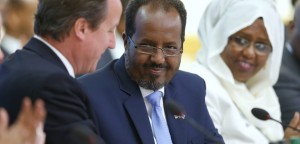By
NEW YORK — Somali President Hassan Sheikh Mohamud rules what may be the world’s most failed state, one wracked by poverty, corruption, and a grueling fight against a deadly Islamist militant group. Shortly before arriving in the United States for the United Nations General Assembly, though, Mohamud got a rare bit of good news: The speaker of Somalia’s parliament was dropping an effort to impeach him.

That’s a major win for Mohamud — and, potentially, his entire fractured and fractious country. Mohamud came to New York in part to secure further support for Somalia’s ongoing battle against al-Shabab extremists, and the looming possibility of impeachment would not have helped his case.
“It had no legal base,” Mohamud told Foreign Policy in an exclusive interview at U.N. headquarters in New York on Sept. 29. “It was intended to obstruct the government from moving and making progress toward an electoral process in 2016.”
Those are precisely some of the charges Mohamud’s opponents have been leveling at him. At least 90 of Somalia’s 275 lawmakers — who were elected through a loosely organized clan-based representation system — were reportedly in favor of debating his impeachment in parliament, citing 14 points of failure, including failing to implement the country’s constitution. The parliament would have needed two-thirds approval to move forward.
That’s not to say that Mohamud is on solid ground at home, where his opponents are promising to continue pursuing the case.
“We have neither discussed nor given up the motion,” Mohamed Abdullahi Fadhaye, a lawmaker who supported the impeachment motion, told Reuters on Sept. 26. “We shall take the matter to the court.”
Mohamud wasn’t the only one relieved to have the motion put on hold — for now at least. Donor nations like the U.S. and the United Kingdom see the academic activist as Somalia’s best hope for a peaceful transition to democracy (neither he nor the country’s parliament was directly elected). Their patience for the East African nation, which has been without a fully functioning government since 1991, could wear thin with another unexpected transition of power. In recent years, the presence of al-Shabab terrorists and the threat they pose to the stability of the entire region has made Western nations even more concerned about the situation there.
Late last month, the U.N., European Union, U.K, and the U.S. released a joint statement calling on members of the Somali parliament to dismiss the impeachment motion and instead prioritize moving toward as free and fair of an election as can be hoped for Somalia in 2016, when the country is scheduled to hold its first democratic process since 1967. “The submission of any such motion requires a high standard of transparency and integrity in the process and will consume extremely valuable time,” the statement read.
Bronwyn Bruton, deputy director of the Africa Center at the Atlantic Council, a think tank in Washington, D.C., said the support thrown behind Mohamud has much less to do with his abilities as a leader and a lot more to do with the international community’s unwillingness to deal with another political transition in a country that has lacked a federal government for more than two decades and has gone through more than 10 prime ministers in the past decade.
“By any objective standard, he should be impeached,” she told FP in a phone call. “He is very corrupt, and he is guilty of several major abuses of power. If this was a normal functioning government, there’s no way he should be allowed to stay in his office.”
Read more: The Failed State Roadshow
Source: FP



